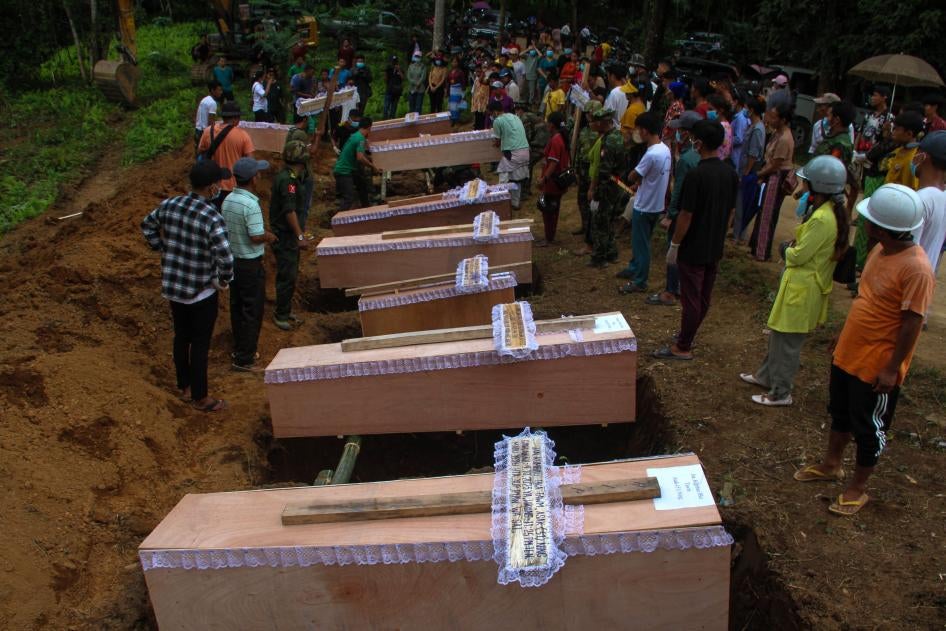In the early morning of February 1, 2021, the Myanmar military sent armored vehicles through the capital, Naypyidaw, arresting the country’s elected civilian leaders. Three years on, the junta’s relentless efforts to consolidate power have caused a spiraling human rights and humanitarian catastrophe.
Junta security forces have killed over 4,000 people, arrested over 25,000, and deliberately blocked humanitarian aid from reaching millions of people amid countrywide economic and infrastructure collapse. The number of people needing assistance has grown from 1 million before the coup to 18.6 million in 2024, including 6 million children.
The military’s widespread and systematic abuses amount to crimes against humanity and war crimes, fueled by decades of impunity and meager international efforts to stop the violations.
While atrocities spiral and slivers of refuge disappear, the United Nations Security Council remains at a standstill.
In December 2022, the Security Council passed its first resolution on Myanmar since the country’s independence in 1948, denouncing the military’s post-coup abuses. But the final text was troublingly watered down, with the calls for sanctions and arms embargoes in an initial United Kingdom-led draft removed to stave off threatened vetoes from China and Russia.
The UK, the Security Council’s designated penholder for resolutions on Myanmar, has for years taken a hyper-cautious approach to the country, a strategy that failed to promote any chance of accountability in the wake of the military’s 2017 crimes against humanity and acts of genocide against the ethnic Rohingya.
When the resolution passed—with 12 members in favor and abstentions from China, Russia, and India—the UK and others presented the compromised text as a first step, opening the door to heightened scrutiny of the atrocities taking place on the ground. “We stand ready to take further action,” the UK ambassador said. “We expect this resolution to be implemented in full.”
One year on, that further action has not materialized. Without any leverage or enforcement mechanism in the resolution, the junta has disregarded the document’s calls, such as for the release of prisoners and full, safe, and unhindered humanitarian access.
Instead, since the resolution was passed, security forces have arrested more than 2,200 people, killed over 1,700, and bombed schools, hospitals, and displacement camps.
The junta has ramped up its deadly blockages of humanitarian aid as a method of collective punishment against the civilian population. After Cyclone Mocha made landfall in May, junta authorities refused to authorize travel and visas for aid workers, release urgent supplies from customs and warehouses, or relax onerous and unnecessary restrictions on lifesaving assistance for millions of people in need. The UN estimates that 10,000 children under 5 died in 2023 due to the lack of treatment for malnutrition.
Since late October, fighting between junta forces and alliances of ethnic and anti-junta armed groups has erupted across much of the country. Over 660,000 people have been forced to flee their homes in the months since, pushing the total number of internally displaced to 2.6 million.
“We’re living in constant fear of attacks, arrests, and harassment by the military,” said a villager in Rakhine State, where fighting broke out in mid-November, ending a year-long unofficial ceasefire. “Most of the men from Rakhine villages have gone into hiding to avoid arrest. The fighting left so many of our houses destroyed to the ground. All communication from other townships has been shut down.”
The latest spike in fighting has triggered further restrictions, with the military blocking urgently needed access to major roads, telecommunications services, and waterways.
“All the nongovernmental organization work has been suspended and the roads and communication to the north and south have been blocked since the attacks on November 13,” an aid worker in Rakhine State told Human Rights Watch. “There are new checkpoints set up by the Border Guard Police at the town entry points. We’re already facing a food crisis because we can’t get essential goods and food from the blocked villages. The costs of everything have gone so high.”
The authorities have prevented the humanitarian organization Médecins Sans Frontières (MSF) from operating its 25 mobile clinics in Rakhine State. “The continuation of these current blockages will have a catastrophic impact on people’s health,” MSF said.
These restrictions sustain the military’s longstanding “four cuts” strategy, designed to exert control over an area by isolating and terrorizing civilians. They also violate Myanmar’s international obligations on the rights to life, health, and shelter.
The junta’s abuses are having an increasing impact beyond Myanmar’s borders as well, spilling over into China, India, and elsewhere in Southeast Asia.
Meanwhile, the 2022 Security Council resolution has not become the hoped-for on-ramp to stronger action, but the feeble peak of council activity on a country in harrowing crisis.
The coup anniversary and the junta’s unrelenting repression should mobilize the UK to lead Security Council members into taking concrete steps. Members should pass a binding resolution instituting a global arms embargo, referring the country situation to the International Criminal Court, and imposing targeted sanctions on the junta’s leadership and military-owned companies. And if Russia and China block a resolution, then individual governments should use their own national sanctions capabilities to work toward a de-facto global arms embargo—in line with the UN General Assembly’s call for states to halt arms transfers to Myanmar back in 2021.
The Security Council should hold regular public meetings to be briefed on junta atrocities and people’s efforts to assert their rights. Governments should take more concerted measures to pressure the junta and support Myanmar civil society. The voices of the Myanmar people should be guiding international efforts, their resolute struggle for democracy and freedom a clarion call that global actors need likewise to persevere. There is no other way forward.








